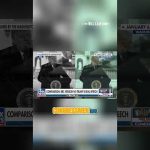Americans are being told to sleep easy while another stranger drifts through our celestial neighborhood — but this is no ordinary pebble. The interstellar object cataloged as 3I/ATLAS was first detected this summer and is set to sweep through the inner solar system, giving scientists a rare chance to study an object that did not originate in our own backyard.
Harvard astrophysicist Dr. Avi Loeb told Newsmax this week that the anomalies around 3I/ATLAS remain unresolved and demand real investigation, not hand-waving from armchair experts. Loeb bluntly pushed back against the shrugging chorus that insists “it’s just a comet,” arguing that science requires evidence, not appeals to authority. If our institutions are serious about protecting the public and advancing knowledge, then we should listen when a credible scientist says there’s a puzzle worth solving.
The list of oddities around this visitor is not trivia: observers report sunward jets, strange chemical ratios, unusual polarization, and an alignment with the plane of our solar system that seems statistically unlikely for a random interstellar rock. Those are not the sort of details you casually dismiss when national security and scientific discovery are at stake. Patriots should expect our agencies to investigate every anomaly with vigor, not bury inconvenient questions behind bureaucratic indifference.
To be fair, NASA’s acting administrator has publicly maintained that 3I/ATLAS behaves like a comet and poses no danger, and many in the mainstream scientific community echo that confidence. Yet questions remain about delayed image releases and whether staffing shortfalls or excuses are being used to dodge scrutiny — a pattern Americans know too well when government agencies would rather soothe headlines than answer tough questions. The sensible course is transparency and data, not reassurances handed down from on high.
Enterprising members of Congress aren’t content to sit on their hands: Rep. Anna Paulina Luna and others have urged NASA to use available assets to monitor the object closely and to disclose what they find to the public. When an elected official demands oversight, that’s a healthy check on technocrats who would prefer to keep the public in the dark. If Washington still works for the people, oversight should mean real action — not press releases that say everything is fine.
Dr. Loeb has been consistent: he rates unusual objects on a scale that forces scientists to be explicit about possibilities, even if one of those possibilities — technological origin — sounds uncomfortable to establishment thinkers. He’s called for extended monitoring, more telescope time, and even creative use of existing spacecraft to gather data now rather than waiting for comfortable consensus. That kind of curiosity and courage should be encouraged, not mocked; America built its greatness on bold exploration and a refusal to bow to groupthink.
Hardworking Americans know the difference between confidence and complacency. Whether 3I/ATLAS proves to be an exotic comet or something that rewrites our understanding of the universe, the right response is the same: insist on full transparency, fund the instruments that keep us safe, and back scientists who ask uncomfortable questions. Don’t let bureaucrats and bloviating experts tell you to relax — demand answers, demand accountability, and keep your eyes on the sky.




